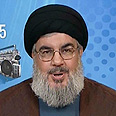
Hezbollah leader Hassan Nasrallah
צילום: AFP
Servant of two masters
Op-ed: Arab journalist says Syrian war shows conflict with Israel was never a top priority for Hezbollah
Some of Hezbollah's harshest critics claim the organization has turned its weapons away from the conflict with Israel and toward a conflict with the Syrian people. The recent battles raging in the city of Qusair, they say, are a testament to this change within the Lebanese Shiite group.
However, in my estimation, this is false interpretation of Hezbollah and its considerations. The critics have not internalized the fact that even when the organization fights Israel, it is actually fighting on behalf of the Syrian and Iranian regimes.
Without this interpretation it would be impossible to explain Hezbollah's growth in the 1980s, as the group's success was not only military in nature. In the first decade of Hezbollah's existence it succeeded in erasing its competitors – all those forces that wanted to fight Israel while maintaining their independence from Syrian and Iranian dictations. As opposed to these groups, Hezbollah synchronized the goal and the means: It made certain that the means would always be subjected to the goals, and that the goals would never lack means.
One example of this is Israel's decision to unilaterally withdraw from south Lebanon in 2000. This decision did not satisfy Hezbollah. Despite the liberation of lands, the organization - along with the sponsoring regime in Damascus - chose to use the Shebaa Farms as an excuse to continue the conflict.
Obviously, the main reason for this development was Syria's fear that Israel's withdrawal would bring Lebanon's demand for a Syrian withdrawal closer to reality. Indeed, this eventually resulted in a series of events that led to former prime minister Rafik Hariri's detachment from the patrons in Damascus.
Hezbollah carried on its shoulders the mission of liberating the lands, and it also paid the price for it. However, as the liberation of south Lebanon in 200 proved, Hezbollah did not have Lebanon's national interests in mind when it fought to free the lands. Actually, when then-Israeli Prime Minister Ehud Barak suggested the idea of a withdrawal from south Lebanon, Hezbollah was not pleased. Rather, it was surprised by the "unwelcome" development, and it was all the more surprised when Israel actually retreated.
These past events, and the considerations behind Hezbollah's decisions, resonate today amid the fighting in Qusair. These reverberations clarify the central contradiction in Hezbollah's outlook: A group whose existence and activity is dependent on the existence of the regimes in Iran and Syria – not on its conflict with Israel.
This reality puts in a ridiculous light Hezbollah's claim that the conflict with Israel is its top priority. Actually, the Shiite group has never prioritized the conflict against Israel. What has been prioritized is Hezbollah's ability to market the narrative that it has prioritized the war against Israel. In doing so, Hezbollah caused many in the Arab world – and in Lebanon in particular – to believe it.
Only now, as Hezbollah fighters are assisting Assad's forces in the battles against the rebels, the organization's true nature is being revealed.
Hazem Saghieh is a senior columnist and editor at the London-based Al-Hayat daily










